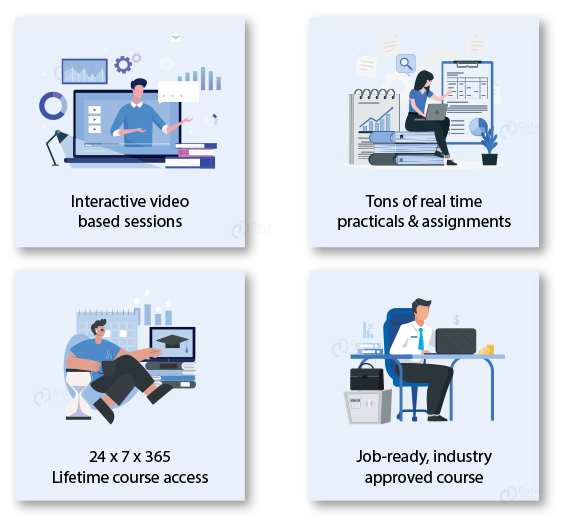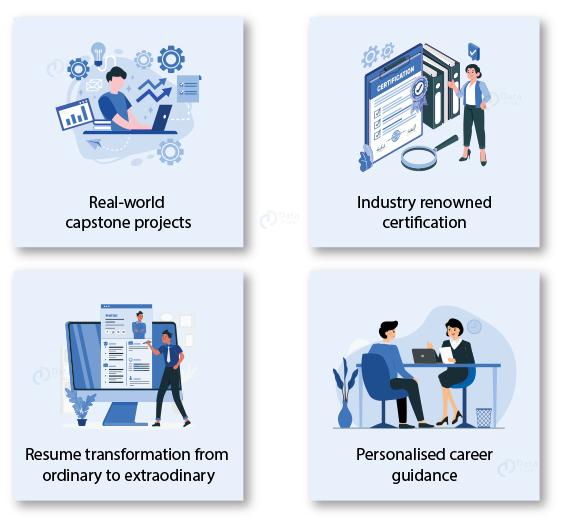Free Deep Learning Course with Certificate in Hindi
 Artificial intelligence’s branch of deep learning, which has changed fields as diverse as banking and healthcare, is at the vanguard of new technical developments. It has the ability to provide important insights, resolve complicated issues, and develop intelligent systems that can learn and adapt on their own in today’s data-driven world.
Artificial intelligence’s branch of deep learning, which has changed fields as diverse as banking and healthcare, is at the vanguard of new technical developments. It has the ability to provide important insights, resolve complicated issues, and develop intelligent systems that can learn and adapt on their own in today’s data-driven world.
What will you take home from this Free Deep Learning Course?
- Self paced video-based course
- Complete study materials, practicals, quizzes, projects
- Acquire practical knowledge which industry needs
- Practical Deep Learning course with real-time case-studies
- Lifetime access with industry renowned certification
Why should you enroll in this Free Deep Learning course?
- Deep learning presents an opportunity to work on the most cutting-edge AI projects
- Businesses are actively looking for experts in this subject, and the job market for deep learning specialists is rising
- Deep learning training can lead to leadership positions and higher-paying jobs, which will advance your career
- A thorough knowledge of neural networks and how they are used
- Practical knowledge of well-known deep learning frameworks such as TensorFlow and PyTorch
- The capacity to design and develop deep neural networks for use in a variety of activities
- This technology is employed in a variety of sectors, including healthcare, banking, autonomous vehicles, and more
- Deep learning is a major force behind the AI revolution
- Using cutting-edge AI techniques, deep learning helps you to solve challenging real-world issues
- You’ll acquire sophisticated problem-solving and critical thinking techniques that go beyond AI
- Deep learning gives you the ability to develop cutting-edge AI-driven goods and services
- In highly competitive job marketplaces, having deep learning skills gives you an edge
- You can develop AI by participating in research projects that are frequently included in a deep learning course
- You’ll establish relationships with knowledgeable professors and peers who share your interests, expanding your professional network
- Proficiency in problem-solving and working with real-world datasets
- Insight into the most recent developments and trends in the field of deep learning
- A completion certificate that you can use to demonstrate your knowledge to future employers
- You can contribute to the potential improvement that AI and deep learning could bring about on a global scale
- Learning deep learning is intellectually stimulating and pushes the limits of technological innovation
Deep Learning Course Objectives
The Deep Learning course is a thorough academic program created to give students the knowledge and abilities they need to succeed in the rapidly evolving fields of artificial intelligence and machine learning. The Deep Learning course covers subjects including neural networks, convolutional neural networks (CNNs), recurrent neural networks (RNNs), and advanced architectures like generative adversarial networks (GANs) and Transformers.
It also delves deeply into the fundamentals of deep learning. With the use of well-known deep learning frameworks like TensorFlow and PyTorch, participants will be able to construct and train sophisticated neural networks for a variety of uses, from image recognition to natural language processing. This Deep Learning course’s emphasis on application is one of its main selling points.
Giving learners a strong foundation in the ideas and mathematics underlying deep neural networks is one of the main goals of a deep learning course. This entails comprehending the operation of synthetic neurons, activation processes, and backpropagation mechanisms. Participants are well-equipped to understand more intricate deep learning principles and systems after mastering these fundamentals.
Enabling participants to acquire practical abilities in deep neural network construction, training, and tuning is a key goal. Working with well-known deep learning frameworks like TensorFlow and PyTorch is required for this, as is having practical expertise in the implementation of neural networks for tasks like image classification, natural language processing, and generative modeling. Participants learn how to use deep learning to solve problems in the real world through a series of supervised exercises and projects.
Participants will work on practical projects that test their ability to use their deep learning expertise to address challenging issues and create ground-breaking AI solutions. This Deep Learning course offers a structured and immersive learning experience that will equip you to harness the power of deep learning and stay on the cutting edge of technological advancements, whether you’re a beginner looking to dive into the fascinating world of AI or an experienced data scientist aiming to deepen your expertise.
Innovative thinking and problem-solving are frequently emphasized as essential goals in this deep learning course. When utilizing deep learning approaches in diverse fields, participants are urged to think critically and creatively. The goal of the course is to encourage innovation and adaptability, empowering students to take on fresh problems in the quickly developing field of artificial intelligence. Participants should be able to see opportunities to use deep learning for novel solutions and technological improvements by the end of this Deep Learning course.
Why should you learn Deep Learning?
Gaining the technical knowledge of Deep Learning will open numerous opportunistic doors for you. Below are some facts and statistical information about why one should learn Deep Learning-- “AI will significantly affect the world economy. It may boost the world GDP by $13 trillion by the year 2030. -McKinsey & Co.
- The greatest advancement in AI is deep learning. –Geoffrey Hinton, a deep learning pioneer.
- Deep learning will alter a number of different businesses. —Sundar Pichai, Google’s CEO.
- “Deep learning and AI are the way of the future of healthcare.” -Dr. Fei-Fei Li, co-director of the Stanford AI Lab.
- The secret to maximizing the potential of autonomous vehicles is deep learning. –Elon Musk, CEO of SpaceX and Tesla.
What is Deep Learning?
Artificial intelligence (AI) and machine learning’s area of deep learning aims to mimic how the human brain analyzes information and learns from data. Deep learning is fundamentally based on the utilization of artificial neural networks, which are made up of interconnected layers of synthetic neurons, or “nodes.”
These networks are especially well-suited for tasks like image identification, natural language processing, and voice recognition since they are built to automatically learn and extract meaningful patterns and representations from massive amounts of data. Deep learning’s intricacy and depth set it apart from conventional machine learning techniques. Deep neural networks are made up of several hidden layers, each of which is in charge of identifying various degrees of abstraction and complexity in the data.
The existence of these numerous levels is indicated by the word “deep” in “deep learning.” Deep learning models employ a technique called backpropagation to modify the strength of connections (weights) between neurons to reduce the discrepancy between predictions and actual data, thereby “teaching” the network to recognize complex patterns and make precise predictions. Deep learning is projected to become increasingly important in the field of AI and machine learning as technology develops and its applications grow.
What to do before you begin?
Before diving into this Deep Learning course, here are some suggestions that you can follow. Please note that these suggestions are in no form mandatory to follow as everything is covered in this Deep Learning course, thoroughly.
- Since Python is the primary language used in deep learning frameworks, proficiency in the language is essential.
- Understanding matrices, vectors, and derivatives will be helpful for understanding the mathematics underlying deep learning algorithms. Linear algebra and calculus.
- Learn the essentials of machine learning, such as supervised and unsupervised learning, by being familiar with its terminology.
- Data preprocessing and model evaluation will benefit from your understanding of statistics.
- Acquire the skills necessary to preprocess and modify data using NumPy and Pandas packages.
Who should go for this free Deep Learning course?
As businesses in numerous industries become more aware of the possibilities of AI-driven solutions, the need for experts with deep learning experience keeps rising. A Deep Learning course can open the door to an effective and lucrative career in artificial intelligence, regardless of your areas of interest: research, development, or application. Deep learning training is advantageous for a wide spectrum of people, but it can be especially helpful for those with particular goals and backgrounds-
- Aspiring Data Scientists
- Machine Learning Engineers
- Software development enthusiasts
- AI Enthusiasts
- IT Graduates
- Aspiring AI Project Managers
By enrolling in our Deep Learning course, you can expect the following benefits:
Participants in a Deep Learning training course should anticipate gaining a thorough understanding of the basic ideas, methods, and practical abilities necessary for using deep neural networks. They will gain knowledge of the structure and operation of neural networks during the training process, starting with simple feedforward networks and progressing to more intricate models like convolutional neural networks (CNNs) and recurrent neural networks (RNNs).
The importance of optimization, regularization, and activation functions for successfully training deep models will also be covered. Participants will understand the significance of datasets in model training as well as how to preprocess and prepare data for deep learning challenges. They will get practical expertise utilizing well-known frameworks for deep learning, such as TensorFlow and PyTorch, which are crucial for real-world applications.
Participants will engage in hands-on activities and projects throughout the Deep Learning course to help them hone the abilities needed to solve challenging issues in areas including computer vision, natural language processing, and autonomous systems. Participants will have the skills and confidence necessary to use deep learning approaches on a variety of AI and machine learning projects by the program’s conclusion.
Deep learning training gives people knowledge in one of the newest and most revolutionary areas of technology today. Convolutional neural networks (CNNs), recurrent neural networks (RNNs), and cutting-edge architectures like generative adversarial networks (GANs) and Transformers are all thoroughly explained. In fields where deep learning is advancing innovation and influencing the future, including healthcare, finance, autonomous cars, and natural language processing, these talents are in great demand.
The need for experts with deep learning abilities is growing, and finishing a training course in this area vastly improves job prospects. Graduates of deep learning programs can work as data scientists, AI researchers, machine learning engineers, and other professions. These positions frequently offer excellent pay and chances for career progression. Deep learning skills also enable people to take part in fascinating projects and solve challenging issues, which makes their work both intellectually stimulating and significant.
Deep learning training fosters analytical and critical thinking skills that can be used in a variety of technological and scientific fields. In conclusion, deep learning training provides a chance to develop sophisticated artificial intelligence skills, opening doors to fulfilling employment prospects and enabling people to take part in ground-breaking technological advancements. The skills and information acquired through deep learning training are becoming more and more valuable as AI continues to develop and change numerous industries.
Below are some major training benefits of Deep Learning-
- Train neural networks to reduce a specified loss function to enhance model performance.
- By avoiding overfitting during training, you may make sure that models can make accurate predictions on new, unforeseen data.
- Automatically identify and display significant features from raw data.
- Enhance training procedures to use fewer resources and less time, which will make deep learning more useful.
Jobs after Learning this Deep Learning Course
- Machine Learning Engineer
Create and implement machine learning models, including deep learning algorithms, to solve challenging issues and enhance goods and services.
- Data Scientist
Deep learning techniques are used by data scientists to glean insights and patterns from huge datasets and aid enterprises in making data-driven decisions.
- AI Researcher
Researcher in Artificial Intelligence: Develop cutting-edge deep learning models and algorithms by designing and putting them into practice.
- Computer Vision Engineer
Work on projects requiring image and video analysis, such as facial recognition, object detection, and autonomous cars, as a computer vision engineer.
- NLP Engineer
Engineer in natural language processing (NLP) with expertise in chatbot building, sentiment analysis, and other language-related tasks.
- Deep learning consultant
Assist businesses looking to adopt AI strategies and solutions using your knowledge of deep learning. The demand for an AI consultant has been increasing in the tech world.
- AI Product Manager
In order to ensure that AI-powered products and services meet both customer needs and corporate objectives, an AI product manager is responsible for overseeing their development and deployment.
- AI Research Scientist
Work as a research scientist (AI) at a university or research organization to develop the field of deep learning through theoretical analysis and hands-on testing.
- AI Ethics Consultant
Focus on assuring responsible and ethical AI development, addressing bias and ethical issues in AI systems, says an AI ethics consultant.
- AI Healthcare Specialist
Apply deep learning to healthcare data for applications like disease diagnosis, drug discovery, and personalized medicine. Healthcare AI Specialist.
- AI Finance Analyst
Use deep learning to improve trading tactics, fraud detection, and risk assessment in the financial sector, says a finance AI analyst.
Our students are working in leading organizations

Online Deep Learning Free Training Course Curriculum
- Understanding Artificial Intelligence and Machine Learning
- Overview of Deep Learning and Neural Networks
- Historical Perspective and Milestones in Deep Learning
- Anatomy of a Neuron
- Activation Functions
- Feedforward Neural Networks
- Backpropagation and Gradient Descent
- Introduction to TensorFlow and PyTorch
- Setting up Development Environment
- Building Your First Neural Network
- Image Data and Its Characteristics
- Convolutional Layers and Filters
- Pooling Layers
- Building CNNs for Image Classification
- Sequence Data and Its Challenges
- RNN Architecture
- Long Short-Term Memory (LSTM) and Gated Recurrent Unit (GRU)
- Applications of RNNs in Natural Language Processing (NLP)
- Deep Residual Networks (ResNets)
- Generative Adversarial Networks (GANs)
- Convolutional Neural Networks for Object Detection (YOLO and SSD)
- Transformer Architecture for Natural Language Processing
- Leveraging Pre-trained Models
- Fine-tuning Models for Specific Tasks
- Case Studies in Transfer Learning
- Optimizers (SGD, Adam, RMSprop)
- Weight Initialization
- Dropout and Batch Normalization
- Overfitting and Techniques to Mitigate It
- Autoencoder Architecture
- Variational Autoencoders (VAEs)
- Clustering and Dimensionality Reduction
- Bias in Data and Algorithms
- Ethical Considerations in AI and Deep Learning
- Fairness and Responsible AI Practices
- Reinforcement Learning and Deep Reinforcement Learning
- Explainable AI (XAI)
- Quantum Machine Learning
- Future Directions in Deep Learning
Features of Free Deep Learning Course


Deep Learning Course FAQs
Deep Learning is a branch of machine learning that concentrates on neural networks and how to use them to solve challenging problems. A Deep Learning course is advantageous since it gives you knowledge in in-demand industries like data science and artificial intelligence.
A fundamental understanding of programming (commonly in Python), a working knowledge of linear algebra, and familiarity with machine learning techniques are typical prerequisites.
The completion of this Deep Learning course may lead to employment as an AI researcher, data scientist, or machine learning engineer. Professionals with deep learning knowledge are in high demand.
Neural networks, convolutional neural networks, recurrent neural networks, deep learning frameworks (like TensorFlow, PyTorch), and advanced architectures like GANs and Transformers are frequently covered in this Deep Learning course.
A solid foundation is provided for beginners in several Deep Learning course. Others, though, could call for pre-existing machine learning expertise.
This Deep Learning course provides alternatives, such as cloud-based computing resources, to make learning more accessible, even though specialist hardware like GPUs can speed up deep learning activities.
Yes, the Deep Learning course contains practical assignments that let you put what you’ve learned to use solving issues from the real world.
Depending on the depth of the course and your learning speed, the duration can range from a few weeks to several months. But with DataFlair, you can complete any course at your own pace and comfort.
Surely you will be rewarded with a certificate upon completion, which can improve your resume and show prospective employers your level of knowledge.
